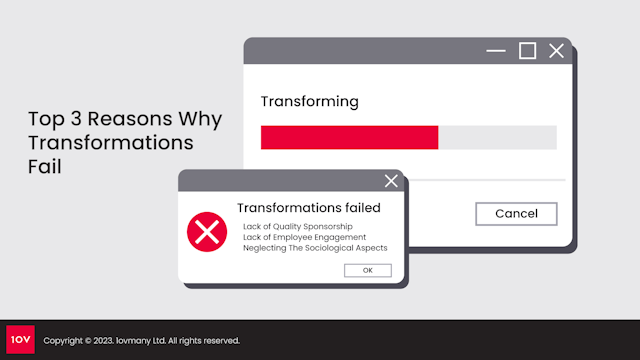No Probation; why we didn't want a Probationary Period
We want 1ovmany to be unique, but we haven't made this decision to 'be unique; we've made it with the hope that it provides a better Employee Experience for the individuals we hire and the system as a whole.
4 September 2022

A unique working model
I’ve been fortunate enough in my career to have had the opportunity to not only move between different organisations but to also operate in different working models, from being a permanent employee to then becoming a freelancer and now transitioning back to a permanent role as a Co-Founder and Director of 1ovmany.
When my business partner Mike and I decided not to have a probationary period for any new joiners at 1ovmany, it was not informed by tried and tested modes of operation for people-related matters but, moreover, our personal experiences.
We like to think in systems, and so when we reflect on what probation has meant to us throughout our careers, we conclude that Probationary Periods are in place to offer some semblance of protection to the newly-hired employee and to the company itself - as though knowing that the company can turn around and withdraw their initial optimism or confidence in that new hire is supposed to provide reassurance to the individual.
Holistic hiring process
When we discuss the reasoning behind our decision not to have a Probationary Period with HR representatives or Legal Personnel, the first rebuttal we hear is, "what happens if you get an employee that you don't want?" of course, a fair case.
This, for me as an employer, creates a choice point, do I follow suit and introduce a probation system, or do I look at our whole hiring process holistically and build a method for hiring, which is essential, what we're talking about here with regards to a Probationary Period, is time.
Why would we treat the situation any differently if the new hire was one week or four months in? If this person has gone through the interview stage, shown us that they're credible and decided to join our organisation, the least we can do is pay that person a month's salary and do everything we can to help them move on and find something better.
It's all about the employees
For us, deciding to remove the Probationary Period is more about giving the employee 'peace of mind'. We made it with the hope that our new hires wouldn't need to 'entertain' us for three months or feel anxious about putting a foot wrong.
Because speaking of our personal experiences, the first three months always felt like being on trial, constantly watched and dealing with my own limiting beliefs asking questions of myself such as;
"Am I going to fit in with the company culture?"
"Are they going to be happy with the standard of work?"
"What happens if I don't live up to expectations?"
From the interview to the third month, the whole experience feels like a test you need to pass, this idea of being worthy of being a part of this organisation when you have very few rights in your first two years of employment.
A decision based on experience
When I became a freelancer, I would operate with contractual agreements, which meant If I were not delivering on the agreed outcomes with my client, the client would have the right to cease our working relationship with 24 hours' notice.
Living with this uncertainty took time for me to adjust to, as security is an important thing I would imagine for most professionals, and something I believed I would lose for not being a permanent employee anymore.
What I noticed in my time as a freelancer and have had the opportunity to be a part of many organisations transformation efforts, looking from a different perspective, outside in if you will, the image of security is a false one, I saw many other behaviours in the first three months of employment for some and still resulting in the same outcome.
This generation of workers and the future generation will have more work mobility; probationary periods feel like an out-dated initiation phase for individuals looking to commit their future to a single organisation.
On the other hand, we want to nurture a culture that embraces change and learns from our mistakes to move forward as individuals and as a system.
The benefit we get from this level of psychological safety amongst our new hires contributes far more to the employee's long-term success - and, therefore, the system - than if we weren't to have consumed the risk of not having a Probationary Period.
More focus on the recruitment process
So the question becomes about how we subsidise for not having a Probationary Period during the recruitment process. Coincidentally, as an unintended consequence of us declaring that we don't want to have probation, it has meant that we've invested more upfront.
With specific reference to our interview process, we take a lot more time to learn about the person in the initial phase of the interview, to understand the candidate and uncover what they want for themselves.
Once we've established this, we can tell them who we are and what we're about and see if there's an alignment between the candidate and us.
In doing this, we deliberately shift the paradigm of the interview process from acting as a 'test'. Instead of hiring the candidate with the most experience, the best skillset or the most credentials, we employ the candidate who encapsulates the most synergy between themselves and the company.
In an interview with myhrtoolkit.com, Head of Law at Sandwell College - Stephen Hone - suggested that "if you need a probation period, you’re basically saying you don't trust your interview process, or you don't trust the interviewer."
He goes on to say "From the employee viewpoint, the first message you give them is ‘well you passed the interview, but we’re not really sure that we trust you or that you are the right person’. Not the best way to build a relationship".
This idea of forging a deeper relationship with our employees from the get-go not only creates an improved work culture, but also demonstrates the faith we have in them as individuals.
Our responsibility as employers
Removing the Probationary Period shifts the onus on us as employers to give more consideration to an employee's Personal Development, Continuous Improvement, and we thus commit to investing in people.
So, as advocates of change, if for whatever reason the new hire hasn't worked out, be that after a week, a month or a year, we must assume the responsibility of making sure that individual leaves better, even if we're not the beneficiaries of that improvement, we've altered the course and paid it forward.
We want 1ovmany to be unique, but we haven't made this decision to 'be unique'; we've made it with the hope that it provides a better Employee Experience for the individuals we hire and the system as a whole.
This is not to say we don't have policies in place that help create boundaries within which to operate. Still, the primary purpose is for the employee to have clarity towards operating procedures and transparency throughout the organisation.
With that said, deciding not to have a Probationary Period was never something for us as employers; the decision was made with Employee Experience at its heart.
We didn't formulate the idea as a 'selling point' for prospective employees to want to work with us. Instead, it derived naturally from our desire to provide the best environment for our people to thrive in and feel secure as valued members of a continuously improving system.
 Team 1ov | 1ovmany
Team 1ov | 1ovmany

About the author
Taner Kapucu
Taner is the Co-Founder and Co-CEO of 1ovmany. He is also the Co-Author of The OKR Method a Strategy & OKR Expert and at times an Executive Business Transformation Coach.






































